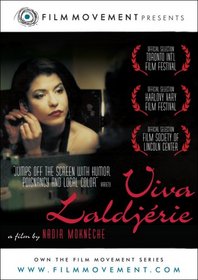| Actors: Nadia Kaci, Jalil Naciri, Kamel Abdeli, Lubna Azabal, Biyouna Director: Nadir Mokneche Genres: Indie & Art House, Drama Sub-Genres: Indie & Art House, Love & Romance, Family Life Studio: Film Movement Format: DVD - Color - Subtitled DVD Release Date: 01/01/2005 Theatrical Release Date: 01/01/2004 Release Year: 2005 Run Time: 1hr 53min Screens: Color Number of Discs: 1 SwapaDVD Credits: 1 Total Copies: 0 Members Wishing: 4 MPAA Rating: NR (Not Rated) Languages: French Subtitles: English |
Search - Viva La'ldjerie on DVD
  | Viva La'ldjerie Actors: Nadia Kaci, Jalil Naciri, Kamel Abdeli, Lubna Azabal, Biyouna Director: Nadir Mokneche Genres: Indie & Art House, Drama NR 2005 1hr 53min This is a story of old and young in Algeria told through a mother and daughter hiding out in a hotel from local terrorists. We follow pretty Goucem (Lubna Azabal), 27, through the urban landscape of modern-day Algiers as s... more » |
Larger Image |
Movie DetailsSimilar Movies
Similarly Requested DVDs
|
Movie ReviewsThe struggle between what we are versus what we would like t Utah Blaine | Somewhere on Trexalon in District 268 | 07/25/2007 (4 out of 5 stars) "The film examines the lives of three women, largely outcasts from society, living in Algeria after the civil war of the mid-1990s. Each of the women, through a combination of bad luck and poor choices, live on the fringe of Algerian society. The main character Goucem (played by Lubna Azabal) is a 27 year old women who works in a photoshop by day and cruises around the clubs at night. She has had a string of come-and-gone lovers and is now considered too old (and too `well traveled') to settle down with a respectable man. Her mother was once a famous singer whose star has long since faded, and now the two of them live together in a small apartment. The rent is paid by a doctor who is having an affair with Goucem. The doctor is married (to a harpy), but refuses to divorce her and is in fact having affairs with many other women beside Goucem. The third women, Fifi, is a prostitute living in the same building. This is a story about the past, the present, and the future. All three women examine where they came from, what they are, and what they would like to be. Fifi is the least unhappy with her life, and accepts her role as an outcast, Goucem wants something steady and secure, but isn't sure what, and Goucem's mother (Papicha) wants to become a star again. The backdrop for the film is post-civil war Algeria, and the clash of the past (represented in part by Islamic fundamentalism) with the uncertain future weighs over the entire film. I found this to be a compelling, well acted, thoughtful film that explores some timeless themes. Lubna Azabal in particular gives a nuanced performance, I suspect that we'll be seeing alot more in the future (I wish Hollywood would hire actress that could act!). This is not a film `about' Algeria in any substantiative sense, with small changes this film could have been set anywhere in the world (i.e. replace Islamic fundamentalists with Christian Evangelicals), so if you are looking for an `Algerian' film, this is not a great choice. A well done, if not uniquely outstanding, film and definitely worth a look." Great Film Except for the Storytelling Part... A. Heifetz | Darien, IL United States | 01/25/2009 (4 out of 5 stars) "Recently, I watched several films dealing with the issues of the Middle East and North Africa, among them Le Grand Voyage, Rachida, Daughter of Keltoum, The Willow Tree, The Syrian Bride, each one is completely different. Viva Laldjerie is not the best but probably the most modern and ambitious of them all. It is exquisitely made, you can see the hand of a master at work. There is a lot going on in terms of details and themes. Goucem (Lubna Azabal) is a lovely woman, and so are many others in he movie. There is a great deal of eroticism in spite of little nudity. The acting is top-notch, which is not always the case in Middle-Eastern films.
In spite of all that, the film was almost painful to watch. In other similar films dealing with women's issues, victimhood was an undeniable fact of life. In Viva Laldjerie, however, I can't help but conclude that in spite of the social problems around her, Goucem was utimately responsible for her situation. She was reckless and flaky. She always made poor choices. She dated a married doctor for three years, expecting him to leave his family. At the same time, she engaged in a promiscuous lifestyle (the scene of men staring at her and her staring back at them while having sex with another in a public restroom is very powerful). Almost to the very end, as the doctor kept lying to her, Goucem was in denial of his true intentions. And then, I wonder why she set up her prostitute friend Fifi to be murdered. She was clearly upset at the loss of Fifi but had no remorse and did not accept responsibility for what she did. Maybe it was just another in a long series of bad judgements and thoughtless acts. The film deserves high marks for its artistic merit, but it is my opinion that, unlike others I have watched, it does not advance women's causes in the Middle East. It appears that the film's intent is a deliberate portrayal of unmarried women as incapable of leading examined lives." |
















